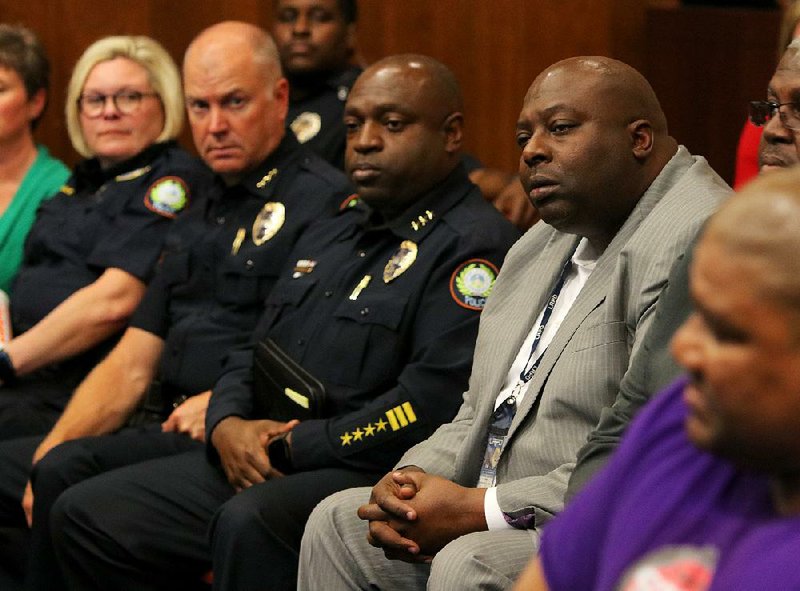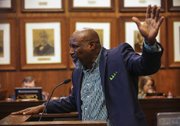Neighborhood leaders on Tuesday evening called for Little Rock to increase funding and resources to community programs, days after an emergency city board meeting to discuss an uptick in shootings and homicides.
The public comments Tuesday continued the city Board of Directors' meeting from Sunday, when Police Chief Kenton Buckner outlined the department's efforts to address a violent-crime trend that began last fall and has continued into 2017. City leaders did not allow public comment Sunday.
On Tuesday, residents spoke about the need to provide jobs for young people and give more resources to people leaving jail and to increase funding to youth community programs. The residents complained about the concentration of liquor stores in certain areas.
The meeting, at times, drew pointed comments from neighborhood leaders, frustrated by what they viewed as the board's inaction in supporting Little Rock neighborhoods.
[HOMICIDE MAP: Interactive map shows killings so far this year in Little Rock, North Little Rock]
"It's been personal. Mayor, when your friends start dying, you tell me how it's not personal to you," said Robert Webb, speaking before the board Tuesday evening. "I can name you brothers [who] have died. We all know them. It's always been personal. It's never been personal to y'all."
Others speakers complained that officials ignore the minority communities south of Interstate 630.
Rizelle Aaron, president of the Arkansas State Conference of the NAACP, said it was clear that part of the urgency of addressing crime was that it now has "jumped the proverbial track."
"And the 'hood has now come to you," said Aaron, addressing the elected leaders. He emphasized that he was not speaking in his official capacity with the NAACP.
Mayor Mark Stodola said at the meeting that every shooting and every violent crime has been a concern to elected leaders.
"We've cared about it for a long time," he said.
Stodola, along with other board members, plan to meet with the community at the Willie Hinton Neighborhood Resource Center at 10 a.m. Saturday and May 13.
The city's Community Programs Department, which funds prevention, intervention and re-entry programs, is working on releasing a request for qualifications for a mentorship program that involves ex-felons and former gang members, department Director Dana Dossett told the board Tuesday.
People who run community organizations should register as a vendor on the city's website so they are automatically notified when requests for applications for funding are sent out, Dossett said.
In Little Rock, homicides and shootings are up this year.
Officials have reported that the shooting death of a 2-year-old toddler in November intensified a long-running feud between two rival groups, leading to a rise in violent crime in the west-central part of the city.
Little Rock police have logged 20 homicides this year, as of Thursday. That's compared with nine killings reported in the same period last year.
As of Thursday, 71 people had been hurt by gunfire in 57 incidents this year, according to police data. Last year, 32 people were injured by gunfire in 31 incidents during that same period.
This year, 243 people were shot at, but not injured, from Jan. 1 to April 27, a spike compared with 87 people who were shot at in that same time period in 2016.
Violent crime overall in Little Rock is also up this year.
Police have recorded 1,080 violent crimes from the beginning of the year through April 24, a 19 percent increase compared with the same time last year, according to preliminary department data.
At Sunday's meeting, Buckner pointed to the department's Violent Crime Apprehension Team, designed to reduce violent crime by focusing on locations and individuals.
Violent crime has trended upward in recent months, but by all accounts, crime overall in Little Rock is down compared with the mid-1990s, when gang violence gained national attention after the release of an HBO documentary Gang War: Bangin' in Little Rock in 1994.
Buckner said he was proud that people came forward Tuesday evening with constructive ideas toward addressing crime. The city now needs to manage those ideas, he said, and take advantage of the energy the speakers have for getting involved.
"It was very reassuring to me that there were so many people here today who clearly understand that you cannot expect the police to fix these decade-long issues that we are having in our community," he said.
Part of the frustration in the black community, Buckner said, stems from a view that the city is now just getting on board in addressing violent crime.
"And we have to be able to connect with them, because there's a lot of very frustrated people," he said after Tuesday's meeting.
Many at the meeting called for the city to support solutions that come from the community members.
"It's hard for me to understand how people that are sitting in unaffected areas are the ones that are making decisions [for] affected areas. The people need to be involved. You can't keep trying to go over the community," Little Rock resident Dawn Jeffrey said at the meeting.
Webb said the elected leaders must challenge the Little Rock Regional Chamber of Commerce to provide youths in the community with jobs, instead of worrying about police resources.
Aaron of the NAACP said he has met with Buckner to discuss NAACP-based initiatives that aim to reduce recidivism rates through providing convicts with resources to employment, housing opportunities and education while they serve time.
"We can't continue to send them back to the same conditions and circumstances that brought them to jail in the first place," he said. "We must develop methods to stop the revolving door from turning."
Aaron said he has heard many criticisms of Buckner's Sunday presentation but that the complaints were personal and not related to the department's efforts.
"I'm concerned that some may be expecting more of this chief than his predecessor because this chief is African-American," Aaron said.
But to restore trust and confidence in the police, Aaron said, Buckner's department should not be able to investigate itself. He said an independent body should be used to investigate residents' complaints against the department.
Officials from a number of community organizations spoke before the board members Tuesday, with some asking for time with elected officials and others asking for help with their facilities and transportation.
Information for this article was contributed by Chelsea Boozer of the Arkansas Democrat-Gazette.
A Section on 05/03/2017


